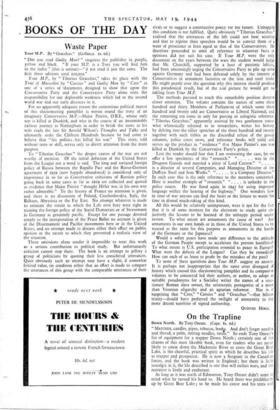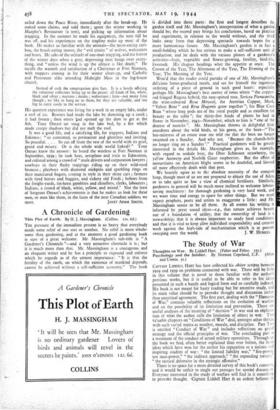On the Trapline
Down North. By Tony Onraet. (Cape. 8s. 6d.)
" MATCHES, candles, pipes, tobacco, boobs. And don't forget needles and thread, a palm, netting needles, twine." So ends Tony Onraet's list of equipment for a trapper Down North ; certainly one of the charms of this most likeable book, even for readers who are never likely to canoe down the Mackenzie River or cross the Great Bear Lake; is the cheerful, practical spirit in which he describes his We as trapper and prospector. He is now a Sergeant in the Canadian forces, and the book was written in England ; but there is little nostalgia in it, the life described is one that will outlast wars, and the narrative is lively and exuberant.
As long as it was north of Edmonton, Tony Onraet didn't seem to mind what he turned his hand to. He heard there was pitchblende up by Great Bear Lake ; so he made his canoe and his tents and
sailed down the Peace River, immediately after the break-up. He staked some claims, and sold them ; spent the winter working in Murphy's Restaurant (a tent), and picking up information .about trapping. In the summer he made his equipment, the next fall he was off, and his experiences on the trapline make up most of the book. He makes us familiar with the animals—the moss-eating cari- bou, the brush-eating moose, the " evil trinity " of wolves, wolverines and bears. He talks of the solitude of one-man trapping, and the horror of the winter days when a grey, depressing mist hangs over every- thing, and " unless the wind is up the silence is like death." He recalls the warmth and satisfaction of a Christmas at Fort Norman, with trappers coming in for their winter clean-up, and Catholic and Protestant alike attending Midnight Mass in the log-house church.
Instead of cash the congregation give furs. It is a lovely offering the volunteer collectors bring up to the priest: all kinds of fox, white, black and silver ; martens ; minks ; wolverines ; lynx—not many lynx though ; we like to hang on to them, for they are valuable, and too big to carry easily to the service.
His queerest experience was living for a week in an empty lake, under a roof of ice. Beavers had made the lake by damming up a creek ; it had frozen ; then otters bad opened up the dam to get at the fish. Tony Onraet sat snug in the lake bed, by a fire which made creepy shadows but did not melt the roof.
It was a good life, and a satisfying life, for trappers, Indians and Eskimos: " so contented, so permanent and ghostless and inviting. So peaceful. . . . So cut off from the rest of the world with its grief, greed and misery. Or is the whole wide world linked? " Tony Onraet knew the answer : he heard the wireless at Fort Norman in September, 1939 ; he took boat, aeroplane and train to Edmonton, and enlisted among a crowd of " mule drivers and corporation lawyers ; cowboys in their flashy trappings riding up on their wild-eyed broncos ; playboys with diamond stickpins and sparkling rings on their manicured fingers, coming in style in their shiny cars • farmers with tired horses and buggies, and rickety old Fords ; hoboes from the freight-yards, tin-horn gamblers and chiselers clerks, labourers ;
Indians, a crowd of black, white, yellow, and mixed." Not the least of Sergeant ()meet's achievements is that he makes us look for these men, or men like them, in the faces of the next Canadian soldiers we



























 Previous page
Previous page